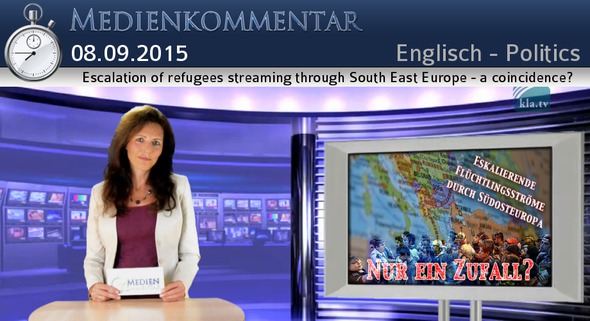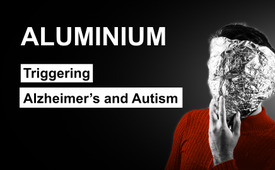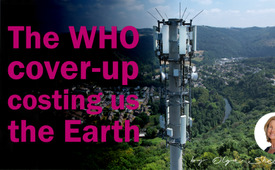Politics (English)
Escalation of refugees streaming through South East Europe - a coincidence?
08.09.2015
Subtitle "Afrikaans" was produced by machine.Subtitle "አማርኛ" was produced by machine.Subtitle "العربية " was produced by machine.Subtitle "Ārāmāyâ" was produced by machine.Subtitle "azərbaycan dili " was produced by machine.Subtitle "беларуская мова " was produced by machine.Подзаглавието "България" е създадено от машина.সাবটাইটেল "বাংলা " মেশিন দ্বারা তৈরি করা হয়েছিল।Subtitle "བོད་ཡིག" was produced by machine.Subtitle "босански" was produced by machine.Subtitle "català" was produced by machine.Subtitle "Cebuano" was produced by machine.Subtitle "ગુજરાતી" was produced by machine.Subtitle "corsu" was produced by machine.Podtitul "Čeština" byl vytvořen automaticky.Subtitle "Cymraeg" was produced by machine.Subtitle "Dansk" was produced by machine.Untertitel "Deutsch" wurde maschinell erzeugt.Subtitle "Untertitel" was produced by machine.Subtitle "Ελληνικά" was produced by machine.Subtitle "English" was produced by machine.Subtitle "Esperanto" was produced by machine.El subtítulo "Español" se generó automáticamente.Subtitle "Eesti" was produced by machine.Subtitle "euskara" was produced by machine.Subtitle "فارسی" was produced by machine.Subtitle "Suomi" was produced by machine.Le sous-titrage "Français" a été généré automatiquement.Subtitle "Frysk" was produced by machine.Subtitle "Gaeilge" was produced by machine.Subtitle "Gàidhlig" was produced by machine.Subtitle "Galego" was produced by machine.Subtitle "Schwizerdütsch" was produced by machine.Subtitle "هَوُسَ" was produced by machine.Subtitle "Ōlelo Hawaiʻi" was produced by machine.Subtitle "עברית" was produced by machine.Subtitle "हिन्दी" was produced by machine.Subtitle "Mẹo" was produced by machine.Subtitle "Hrvatski" was produced by machine.Subtitle "Kreyòl ayisyen " was produced by machine.Subtitle "Magyar" was produced by machine.Subtitle "Հայերեն" was produced by machine.Subtitle "Bahasa Indonesia " was produced by machine.Subtitle "Asụsụ Igbo " was produced by machine.Textun"Íslenska" var framkvæmt vélrænt.Sottotitoli "Italiano" sono stati generati automaticamente.字幕は"日本語" 自動的に生成されました。Subtitle "Basa Jawa" was produced by machine.Subtitle "ქართული" was produced by machine.Subtitle "қазақ тілі " was produced by machine.Subtitle "ភាសាខ្មែរ" was produced by machine.Subtitle "ಕನ್ನಡ" was produced by machine.Subtitle "한국어" was produced by machine.Subtitle "कोंकणी語" was produced by machine.Subtitle "کوردی" was produced by machine.Subtitle "Кыргызча" was produced by machine.Subtitle " lingua latina" was produced by machine.Subtitle "Lëtzebuergesch" was produced by machine.Subtitle "Lingala" was produced by machine.Subtitle "ພາສາ" was produced by machine.Subtitle "Lietuvių" was produced by machine.Subtitle "Latviešu" was produced by machine.Subtitle "fiteny malagasy" was produced by machine.Subtitle "te reo Māori" was produced by machine.Subtitle "македонски јазик" was produced by machine.Subtitle "malayāḷaṁ" was produced by machine.Subtitle "Монгол хэл" was produced by machine.Subtitle "मराठी" was produced by machine.Subtitle "Bahasa Malaysia" was produced by machine.Subtitle "Malti" was produced by machine.Subtitle "မြန်မာစာ " was produced by machine.Subtitle "नेपाली" was produced by machine.Ondertitels "Nederlands" machinaal geproduceerd.Subtitle "Norsk" was produced by machine.Subtitle "chiCheŵa" was produced by machine.Subtitle "ਪੰਜਾਬੀ" was produced by machine.Podtytuł "Polska" został utworzony przez maszynę.Subtitle "پښتو" was produced by machine.Subtitle "Português" was produced by machine.Subtitle "Română" was produced by machine.Subtitle "Язык жестов (Русский)" was produced by machine.Субтитры "Pусский" были созданы машиной.Subtitle "Kinyarwanda" was produced by machine.Subtitle "सिन्धी" was produced by machine.Subtitle "Deutschschweizer Gebärdensprache" was produced by machine.Subtitle "සිංහල" was produced by machine.Subtitle "Slovensky" was produced by machine.Subtitle "Slovenski" was produced by machine.Subtitle "gagana fa'a Samoa" was produced by machine.Subtitle "chiShona" was produced by machine.Subtitle "Soomaaliga" was produced by machine.Subtitle "Shqip" was produced by machine.Subtitle "србски" was produced by machine.Subtitle "Sesotho" was produced by machine.Subtitle "Basa Sunda" was produced by machine.Undertext "Svenska" är maskinell skapad.Subtitle "Kiswahili" was produced by machine.Subtitle "தமிழ்" was produced by machine.Subtitle "తెలుగు" was produced by machine.Subtitle "Тоҷикй" was produced by machine.Subtitle "ภาษาไทย" was produced by machine.ንኡስ ኣርእስቲ "ትግርኛ" ብማሽን እዩ ተፈሪዩ።Subtitle "Türkmençe" was produced by machine.Subtitle "Tagalog" ay nabuo sa pamamagitan ng makina.Subtitle "Türkçe" was produced by machine.Subtitle "татар теле" was produced by machine.Subtitle "Українська " was produced by machine.ذیلی عنوان "اردو" مشین کے ذریعہ تیار کیا گیا تھا۔Subtitle "Oʻzbek" was produced by machine.Subtitle "Tiếng Việt" was produced by machine.Subtitle "Serbšćina" was produced by machine.Subtitle "isiXhosa" was produced by machine.Subtitle "ייִדיש" was produced by machine.Subtitle "Yorùbá" was produced by machine.Subtitle "中文" was produced by machine.Subtitle "isiZulu" was produced by machine.
kla.TV accepts no liability for defective translation.kla.TV accepts no liability for defective translation.kla.TV accepts no liability for defective translation.kla.TV accepts no liability for defective translation.kla.TV accepts no liability for defective translation.kla.TV accepts no liability for defective translation.kla.TV не носи отговорност за некачествен превод.অপর্যাপ্ত অনুবাদের জন্য kla.TV কোন দায় বহন করে না।kla.TV accepts no liability for defective translation.kla.TV accepts no liability for defective translation.kla.TV accepts no liability for defective translation.kla.TV accepts no liability for defective translation.kla.TV accepts no liability for defective translation.kla.TV accepts no liability for defective translation.kla.TV nenese žádnou odpovědnost za chybné překlady.kla.TV accepts no liability for defective translation.kla.TV accepts no liability for defective translation.kla.TV übernimmt keine Haftung für mangelhafte Übersetzung.kla.TV accepts no liability for inadequate translationkla.TV accepts no liability for defective translation.kla.TV accepts no liability for defective translation.kla.TV accepts no liability for defective translation.kla.TV no se hace responsable de traducciones incorrectas.kla.TV accepts no liability for defective translation.kla.TV accepts no liability for defective translation.kla.TV accepts no liability for defective translation.kla.TV accepts no liability for defective translation.kla.TV n'assume aucune responsabilité en cas de mauvaise traduction.kla.TV accepts no liability for defective translation.kla.TV accepts no liability for defective translation.kla.TV accepts no liability for defective translation.kla.TV accepts no liability for defective translation.kla.TV accepts no liability for defective translation.kla.TV accepts no liability for defective translation.kla.TV accepts no liability for defective translation.kla.TV accepts no liability for defective translation.kla.TV accepts no liability for defective translation.kla.TV accepts no liability for defective translation.kla.TV accepts no liability for defective translation.kla.TV accepts no liability for defective translation.kla.TV nem vállal felelősséget a hibás fordításértkla.TV accepts no liability for defective translation.kla.TV accepts no liability for defective translation.kla.TV accepts no liability for defective translation.kla.TV tekur enga ábyrgð á áræðanleika þýðingarinnarKla.TV non si assume alcuna responsabilità per traduzioni lacunose e/o errate.Kla.TV は、不適切な翻訳に対して一切の責任を負いません。kla.TV accepts no liability for defective translation.kla.TV accepts no liability for defective translation.kla.TV accepts no liability for defective translation.kla.TV accepts no liability for defective translation.kla.TV accepts no liability for defective translation.kla.TV accepts no liability for defective translation.kla.TV accepts no liability for defective translation.kla.TV accepts no liability for defective translation.kla.TV accepts no liability for defective translation.kla.TV accepts no liability for defective translation.kla.TV accepts no liability for defective translation.kla.TV accepts no liability for defective translation.kla.TV accepts no liability for defective translation.kla.TV accepts no liability for defective translation.kla.TV accepts no liability for defective translation.kla.TV accepts no liability for defective translation.kla.TV accepts no liability for defective translation.kla.TV accepts no liability for defective translation.kla.TV accepts no liability for defective translation.kla.TV accepts no liability for defective translation.kla.TV accepts no liability for defective translation.kla.TV accepts no liability for defective translation.kla.TV accepts no liability for defective translation.kla.TV accepts no liability for defective translation.kla.TV accepts no liability for defective translation.kla.TV aanvaardt geen aansprakelijkheid voor foutieve vertalingen.kla.TV accepts no liability for defective translation.kla.TV accepts no liability for defective translation.kla.TV accepts no liability for defective translation.kla.TV nie ponosi odpowiedzialności za wadliwe tłumaczenie.kla.TV accepts no liability for defective translation.kla.TV accepts no liability for defective translation.kla.TV accepts no liability for defective translation.kla.TV accepts no liability for defective translation.kla.TV не несет ответственности за некачественный перевод.kla.TV accepts no liability for defective translation.kla.TV accepts no liability for defective translation.kla.TV accepts no liability for defective translation.kla.TV accepts no liability for defective translation.kla.TV accepts no liability for defective translation.kla.TV accepts no liability for defective translation.kla.TV accepts no liability for defective translation.kla.TV accepts no liability for defective translation.kla.TV accepts no liability for defective translation.kla.TV nuk mban asnjë përgjegjësi për përkthime joadekuate.kla.TV accepts no liability for defective translation.kla.TV accepts no liability for defective translation.kla.TV accepts no liability for defective translation.Kla.TV tar inget ansvar för felaktiga översättningar.kla.TV accepts no liability for defective translation.kla.TV accepts no liability for defective translation.kla.TV accepts no liability for defective translation.kla.TV accepts no liability for defective translation.kla.TV accepts no liability for defective translation.kla.TV ንዝኾነ ጉድለት ትርጉም ዝኾነ ይኹን ሓላፍነት ኣይቅበልን እዩ።kla.TV accepts no liability for defective translation.kla. Walang pananagutan ang TV sa mga depektibong pagsasalin.kla.TV accepts no liability for defective translation.kla.TV accepts no liability for defective translation.kla.TV accepts no liability for defective translation.kla.TV عیب دار ترجمہ کے لیے کوئی ذمہ داری قبول نہیں کرتا ہے۔kla.TV accepts no liability for defective translation.kla.TV accepts no liability for defective translation.kla.TV accepts no liability for defective translation.kla.TV accepts no liability for defective translation.kla.TV accepts no liability for defective translation.kla.TV accepts no liability for defective translation.kla.TV accepts no liability for defective translation.kla.TV accepts no liability for defective translation.
This is a modal window.
The media could not be loaded, either because the server or network failed or because the format is not supported.
Escalation of refugees streaming through South East Europe - a coincidence?
Mid August of this year European migration minister Dimitris Avramopoulos said, refugees are in-creasingly entering the European Union through the Balkan countries - the so-called “Balkan route”. In July alone, 35,000 people arrived in Hungary. The streams of refugees using the Balkan route, has meanwhile reached much larger dimensions than that of the dangerous sea passage across the Mediterranean Sea. The governments of the southeastern European countries are completely overwhelmed and the situation threatens to escalate.
[continue reading]
Escalation of refugees streaming through South East Europe - a coincidence?
Download broadcast and attachments in the wanted quality:
Useage rights:
Standard-Kla.TV-Licence
Trending on Kla.TV























Sendungstext
herunterladen
08.09.2015 | www.kla.tv/6659
Mid August of this year European migration minister Dimitris Avramopoulos said, refugees are in-creasingly entering the European Union through the Balkan countries - the so-called “Balkan route”. In July alone, 35,000 people arrived in Hungary. The streams of refugees using the Balkan route, has meanwhile reached much larger dimensions than that of the dangerous sea passage across the Mediterranean Sea. The governments of the southeastern European countries are completely overwhelmed and the situation threatens to escalate. Nearly daily we receive photos of the horror-scenarios in these countries. Andreas Ernst, correspondent for the New Zurich Newspaper (NZZ) and expert on southeast Europe explained: In all these countries reception camps and living quarters for refugees are nonexistent. There are no established systems for refugees there because up until just a few years ago, no one applied as asylum seeker in the Balkan region. This was reason enough for Kla.tv to take a look at this so called “Balkan route” and which coun-tries are involved here as well as what could be the reason for this sudden wave of refugees. First station - Turkey: Almost all refugees from Syria, Afghanistan and Iraq come cross country through Turkey into the European Union. Turkey has taken in, by far the most Syrian refugees: nearly 2 million people. These dislodged live in 20 camps with from 8000 to 27,000 refugees each. According to Swiss Radio, SRF 1 on August 21st, 2015, although the refugees have been taken in and accepted by the people of Turkey, the situation in these camps is dramatic. The United Nations food for the world program had to be stopped in 9 of these 20 camps and Turkey has reached the end of it’s capacity. Second station - Greece: Alone in July nearly 50,000 refugees managed to come by boat from Tur-key to Greece according to SRF broadcasting from the 24th of August. The county administrator of Lesbos said, I quote: “ 298,000 people live on the islands in the north Aegean Sea. Since the begin-ning or this year we have taken in 119,000 refugees. This is far beyond our possibilities.” The con-ditions on the Greek islands, especially on Kos are absolutely untenable. European Director of UNHCR stated: “Total chaos rules on the islands.” There is no functioning infrastructure to take in these people. There are not enough sanitary installations, most of the refugees have to sleep de-fenselessly in the open on the ground. Also riots have broken out and the police had to resort to us-ing clubs against the rioting migrants. Third station - Macedonia: Help organizations estimate that about 2000 people a day cross the bor-der illegally between Greece and Macedonia. Thousands camp in the “no mans land” between the countries while Macedonia has partially sealed the border off. Macedonian police have used tear gas against the enraged refugees as SRF reported on August 21st. According to SRF special correspon-dent Stephan Rathgeb, no one in Macedonia is sympathetic for why such a small country should open the floodgates allowing thousands to pass through the country daily. Austria’s Minister of For-eign Affairs, Sebastian Kurz, was on location in Macedonia on August 24th and said, I quote: “The western Balkan countries are being overrun and left to deal with it on their own.” Station four - Serbia: According to UN Refugee Aid Organization (UNHCR) estimates, only on the weekend of the 22nd and 23rd of August, more that 7000 people reached Serbia. About 4000 of them were stuck on a field in southern Serbia. SRF reported on August 23rd: the Serbian government is totally overwhelmed and the supply situation is highly precarious. Since the beginning of the year more than 35,000 refugees have applied for asylum in Serbia. Station five - Hungary: Many of these refugees want to get into Hungary from Serbia and from there further into western Europe. According to Hungarian official information, 81,000 illegal ref-ugees came into Hungary just this year. 80,000 of these came from Serbia. Most of them want to travel on to Austria or Germany. In order to prevent this storm of refugees from coming in through Serbia, Hungary began in July, to build a barbed-wire border fence. When finished it is supposed to be four meters high 175 kilometers long. These are the stations along the “Balkan route” to central Europe - especially to Germany and Aus-tria. According to the current estimates nearly 800,000 refugees are expected in Germany by the end of the year. Whether this rapid escalation in the number of refugees streaming through central Eu-rope is a a coincidence or whether it was strategically planned, can for the time being only be sur-mised. For German analyst and independent journalist, Christoph Hörstel, it is clear - I quote: “As NATO member countries, naturally we have the possibility, by means of our secret service, to stop such refugee waves and i.e. the refugee smugglers. But no, my analysis is that we are supporting this and there is a lot of data to this.” End of quote. In our recent broadcasts we reported thoroughly concerning data about who could be behind these refugee smuggling-gangs. What we definitely need to focus on when researching the topic of the Balkan region and this mas-sive escalation of incoming refugees there, is the fact that these same countries are all participants in the so-called “Turkish Stream” project. This is an international project to build a gas pipeline along the floor of the Black Sea and into Turkey. The investor behind “Turkish Stream” is the Russian natural gas company, Gas prom, which is completely financing the project. Gas prom is the biggest employer in Russia. The state holds a majority of shares in the company. “Turkish Stream” is supposed to deliver Russian gas to Europe, now that the similar “South Stream” project - to supply Europe across Bulgaria - failed to go through. Due to pressure from the USA, Bulgaria stood up against it. “Turkish Steam” is supposed to be continued from Turkey to Greece. From here, through a central distributor the gas should be transmitted on to Macedonia, Serbia and Hungary. The Foreign Affairs ministers of Greece, Macedonia, Serbia and Hungary met together in Budapest on April 7th, to discuss the “Turkish Stream” project. That just these Balkan countries support the “Turkish Stream” project and are cooperating with Russia, is obviously a thorn in the side of the American government. Amos Hochstein, representative of the US Foreign Affairs Office and ener-gy minister even said openly in his meeting in May, 2015,with Panagiotis Lafazanis, Greek minister for structural reforms - I quote: “The Americans are not going to put up with the Turkish Steam project.” Washington makes no secret of it’s intentions to take the European market business away from Gas prom - especially through political pressure on the business partners. Kla.tv reported recently on this topic. Whether or not the escalating flood of refugees in and through Turkey, Greece, Macedonia, Serbia and Hungary also has to do with their participation in the “Turkish Stream” project cannot be said absolutely. Whether the pipeline project should be hindered by this is not clear. However what can be said is: first of all, that exactly those countries which support the “Turkish Stream” project are being weakened and destabilized through the flood of refugees. And secondly, that US intrumentalizing-handwriting can be found behind the flood of refugees. We leave it up to you va-lued viewers to judge for yourselves whether or not this could be a coincidence.
from dd.
www.srf.ch/news/international/bis-vor-kurzem-hat-niemand-auf-dem-balkan-asyl-gesucht
www.srf.ch/sendungen/rendez-vous/dramatische-lage-in-tuerkischen-fluechtlingslagern
www.srf.ch/news/international/eine-voelkerwanderung-auf-dem-weg-durch-serbien
www.srf.ch/sendungen/srf-4-aktuell/mazedonien-einige-tausend-campieren-im-niemandsland
www.srf.ch/sendungen/info-3/fluechtlingsdrama-in-mazedonien
www.srf.ch/news/international/ungarn-will-fluechtlinge-nur-ausserhalb-von-wohngegenden
www.srf.ch/sendungen/tagesschau/ruecktritt-tsipras-klage-gegen-ensi-tausende-fluechtlinge
www.srf.ch/news/schweiz/fluechtlingselend-im-balkan-wie-die-schweiz-helfen-will
www.srf.ch/news/international/gestern-mazedonien-heute-serbien
www.srf.ch/news/international/ausnahmezustand-mazedonien-in-der-fluechtlingskrise
www.srf.ch/news/international/wasser-damit-die-menschen-wenigstens-nicht-verdursten
http://www.kla.tv/6541
http://derstandard.at/2000015820857/Russlands-Plan-B-Gaslieferungen-ueber-Mazedonien
https://de.wikipedia.org/wiki/Turkish_Stream
http://de.sputniknews.com/politik/20150513/302305115.html